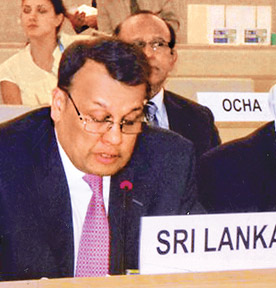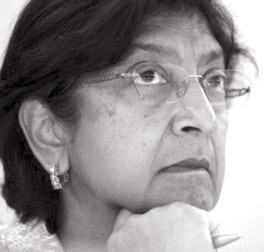China, Russia back Lanka at UNHRC
by Manjula FERNANDO
|

Plantation Industries Minister and Presidential nominee for
Human Rights Mahinda Samarasinghe addressing the 17th Human
Rights Council Session in Geneva.
|
Russia, China and several other countries stood by Sri Lanka at the
17th regular sessions of the UN Human Rights Council when Human Rights
Commissioner Navi Pillay called for an international monitoring
mechanism on Sri Lanka, citing the UN expert panel report, in her
opening day speech on Monday.
Responding to Ms. Pillay’s call, the representative from China Xia
Jingge said it believed that the Sri Lankan Government and its people
had the ability to deal with their internal affairs and the
international community must support the government in its efforts to
reconcile the country and should provide helpful assistance in this
regard.
The representative said the group of experts sent by the UN
Secretary-General (UNSG) was to only advise the Secretary-General and
asked the Human Rights Council to adopt a prudent approach to the
country.
This was a sentiment echoed by the Chinese Foreign Minister Yang
Jiechi during External Affairs Minister Prof.Peiris’ recent state visit.
Foreign Minister Yang Jiechi assured Prof. Peiris that China has
‘total confidence in the capability of the Government and people of Sri
Lanka to resolve their own issues’.
He said that China will stand by Sri Lanka in achieving the tasks of
reconciliation and reconstruction.
While inviting the President for a state visit, the Chinese Foreign
Minister expressed his State’s appreciation of the accomplishments of
the Sri Lankan Government in eradicating terrorism and putting the
country on the track of rapid economic development.
|

Navi Pillay |
Following remarks by Pillai, the representative from Russian
Federation, Konstantin Dolgov speaking in support of its longstanding
ally welcomed the steps taken by the Sri Lankan Government to address
the allegations.
Dolgov said the Russian Federation believes that the approach to this
issue must be independent and impartial, as experience showed that all
parties to a conflict commit violations.
Ambassador and Permanent Representative of Pakistan to UN in Geneva
Zamir Akram, speaking on behalf of the Organization of the Islamic
Conference, said the Organization of the Islamic Conference was of the
opinion that the report concerning the events of Sri Lanka was an
internal document of the Secretary-General, included information never
verified, and that the ongoing efforts in Sri Lanka for peace and
reconciliation should be supported by the international community.
Pakistani diplomat Mariam Aftab highlighting a report on official
development assistance to help Sri Lanka fight poverty noted that the
international community should assist Sri Lanka to rise since it has
fought the scourge of terrorism and won.
Norwegian representative Bente Angell-Hansen noted the intent of Sri
Lanka to address the residual issues after the conflict in an inclusive
and just manner.
“Norway remained committed to supporting the efforts of the
Government of Sri Lanka in ensuring rights, development and prosperity
of all its citizens,” she said.
According to reports Ireland joined EU, US, UK and France to renew a
call for an international investigation.
Sri Lankan permanent representative in Geneva Kshenuka Senewiratne
rejecting the call by the Human Rights Commissioner at the inauguration
on Monday slammed that her remarks indeed questioned her objectivity and
call into question, the professionalism and independence of the Council.
In a subsequent speech Senewiratne said the Commissioner wished to
cite from a report that was produced not as a result of an inter
governmental process, and ignored all relevant rules of procedure.
She said this would establish a dangerous precedent and certainly
undermine the credibility and objectives of this august body.
“We call upon the member states of the World Body to unite against
such possible machinations, by disallowing negative precedents to become
concretised.
“It may wrongly be used on us today and one of you tomorrow.”
She said “It is widely known that the said report was borne outside
of an intergovernmental process.” It is a report which was initiated
solely by the UNSG to advise himself on the modalities, applicable
international standards and comparative experience relevant to an
accountability process in respect to the conflict in Sri Lanka.” It is
extremely unfortunate, Mr President, that the High Commissioner has
thought fit to refer to it in her report to the 17th Session of the HRC.
The High Commissioner has resorted to drawing on recommendations
culminating from a report of a non intergovernmental process, which also
has no official status in the UN system. This Council would agree that
at no point has it sought this so-called information referred to by the
High Commissioner.
The High Commissioner unbecomingly deems it appropriate to call for
action on the recommendations of the said report which are based on
unverified information and also un-sourced.
In fact the Report itself states that the facts are unsubstantiated,
whereas the information being processed by Sri Lanka’s domestic
mechanism, has been collected through the conduct of open and
transparent hearings, including from the former theatre of conflict,
which would enable a careful evaluation of such material to culminate in
considered conclusions, the Lankan envoy explained to the 47 member
body.
She said the High Commissioner has prejudged the ability of the
domestic mechanism even before it has completed the mission, by pledging
her full support to an international mechanism being established to
monitor national investigations.
The bona fides of her position in this regard comes into question, as
the accepted practice is to provide the domestic processes adequate time
and exhaust all available domestic recourse, prior to resorting to any
international mechanism.
This basic requirement of the need to give the domestic mechanism
space, time and opportunity should be known by the High Commissioner,
unless she wishes to ignore it for a reason of her own.
The lack of objectivity shown by the High Commissioner does not augur
well on the work of her office to engage construction with the
Government of Sri Lanka. The unrelenting criticism, constant negativity
in approach and the unwillingness to recognize the enormous strides made
by the Sri Lankan Government are counterproductive to the process of
engagement.
She added unfortunately the High Commissioner’s statement has also
given the cue for similar references by some countries concluding that
Sri Lanka looked forward to the dawn of a better era of engagement with
the Office of the High Commissioner.
Minister Mahinda Samarasinghe in his address to the assembly said Sri
Lanka believes healing the wounds of the recent past is important to
sustained reconciliation and it was one of the biggest challenges of the
post-conflict phase.
It is to address this challenge, that the Lessons Learnt and
Reconciliation Commission (LLRC) was established in May 2010 by the
President.
It is important to remember that this domestic process was
established and commenced work prior to the establishment of the
advisory Panel of the UN Secretary General.
The LLRC is pursuing truth, justice and reparation. It has been
engaging in hearing the experience of affected persons, listening to
their stories, examining them to elicit the truth and draw possible
investigative material to enable further follow-up action. “Despite the
repetitive clarion calls for accountability, we have taken on the
responsibility to examine the conflict which lasted nearly three
decades, in a holistic manner, with a view to prescribing remedial
action that will prevent any further violence in our country.”
“Having commenced its substantive work in August 2010, this domestic
process has yet to complete one year, and similar processes elsewhere,
as you very well know, have taken far longer.”
The Minister emphasised that in this context it is disconcerting to
note the haste of the sections of the international community to dictate
terms to Sri Lanka on its domestic process of accountability.
“Undoubtedly, there is no international panacea that can be applied
to such a complex set of domestic issues. We firmly believe that our
home-grown process is capable of addressing the nuances of our unique
situation.”
The minister explained that the LLRC which was earlier scheduled to
conclude its work this month, has sought and received an extension of
its tenure by six months, to examine further relevant testimony and
information which have come to light.
“We urge those critics, to desist from arriving at hasty conclusions,
and afford Sri Lanka the time, space and opportunity it needs to
complete our domestic process,” he said adding that some of the already
implemented recommendations of the LLRC include the reduction of High
Security Zones, the closure of the Omanthai detention centre, the
release of a large number of ex-combatants, the resolution of land
disputes and the swift steps taken to ensure that no groups carry
firearms with a deadline for the surrender of illegal weapons.
It is undeniable that the humanitarian operations in Sri Lanka
resulted in the rescue of over 290,000 persons - innocent civilians -
held hostage by a terrorist organization proscribed in over 30
countries.
The humanitarian operation was therefore a part of an act of the
sovereign State and its people in the wake of terrorist aggression. It
is equally undeniable that Sri Lanka has taken definite steps at great
cost to resettle and rebuild the lives of the people in the
conflict-affected area.
In this light, Minister Samarasinghe said, the recent
characterisation by the High Commissioner Pillai of the very nature of
the operation as one which was conducted “under the guise of fighting
terrorism”, is most unfortunate. Such a characterization is wholly
misplaced, as the community of nations was well aware that Sri Lanka was
combating one of the most ruthless terrorist organisations in the world.
The sessions will continue till June 17.
Minister Nimal Siripala de Silva and Attorney General Mohan Peiris
comprised the Lankan team led by Minister Samarasinghe and included
experts from different fields of concern to counter the allegations
against the country. |

